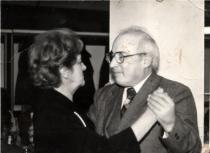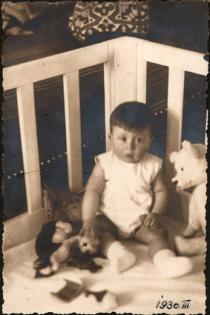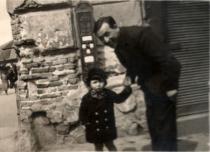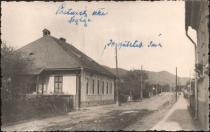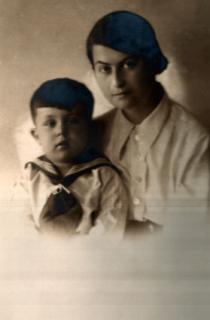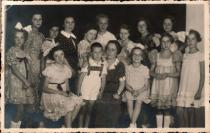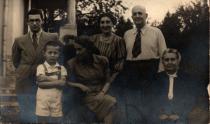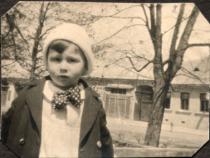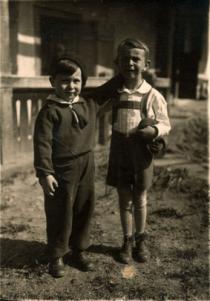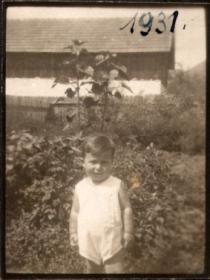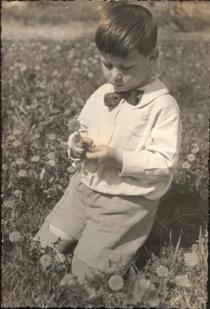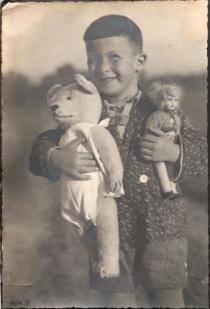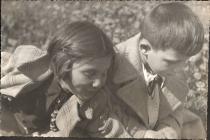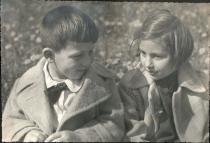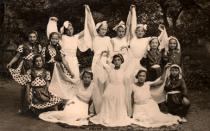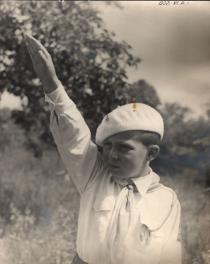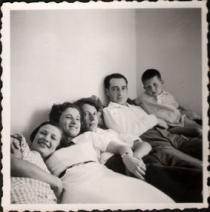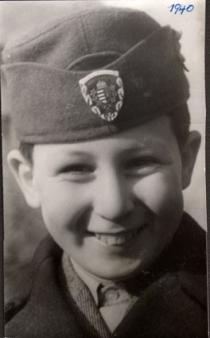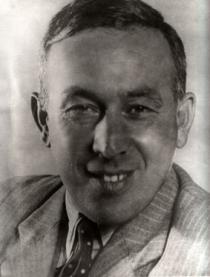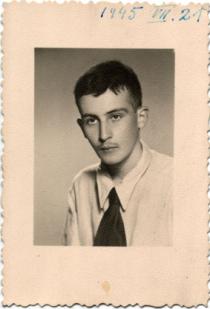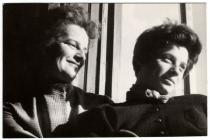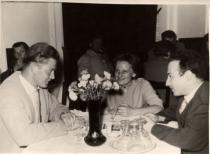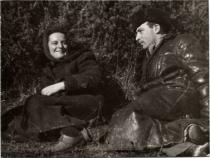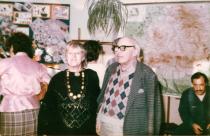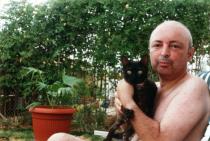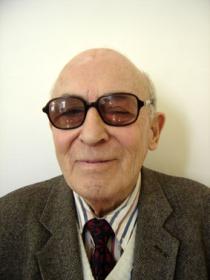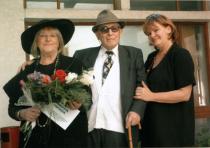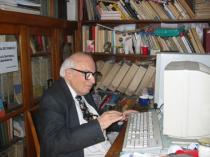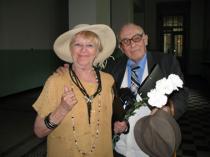This is me [Janos Gottlieb]. This is the first photo taken of me after I came back to Nagybanya from deportation.
I arrived to Nagybanya on July 14th 1945, and this was taken on July 21st, so after one week.
I looked fine, didn’t I? I had such a look, that as I was walking in the town, met my colleagues, and addressed them, they didn’t recognize me. I had to explain them who I was.
If I know well, in Nagybanya they sent people into the ghetto on 5th May 1944.
In the outskirts of Nagybanya there was an abandoned building, I think it used to be a brick factory or something like that, which was out of function.
They put us in, of course 'la gramada' [piled up], as one would say in Romanian, one stack to the other.
I don't know how many we were there. We had to sleep on the ground, on straw and things like that.
My father knew about Auschwitz. In Nagybanya nobody knew anything about Auschwitz and all these concentration camps.
I don't know how, but he knew these camps existed.
In the ghetto my father told me they would take us away, and we would face great torments in the concentration camp and so on, and there was no reason to expose ourselves to this.
That's why it occurred that two or three weeks after they started to gather us into ghettos in Nagybanya, we wanted to commit suicide together with a doctor's family. Me too.
The doctor - Benedek, I don't remember his first name -, his wife, their child, me, my dad and my stop-mother, all the six of us.
With morphine. The doctor gave us the injection. Control wasn't so tight yet in the ghetto, so he procured a dose enough for all the six of us. Only three died from the six.
He, that is the doctor, his son and my step-mother. The doctor's wife survived, my father and me too.
One might ask why we survived. I found out then that, interesting enough, even if morphine is administered through injection, it goes through the stomach, so it gets first into the stomach, and it would be absorbed from there.
So when they found us, they took us at once to the hospital, and carried out gastric irrigation.
Besides I was young, fifteen and a half years old, at this age the organism is very strong, and it overcame morphine.
My father survived, because he didn't know that nicotine works as an antitoxin to morphine to a certain degree. And he used to smoke a lot out of nervousness.
Such odd things can happen in one's life. That's how the two of us survived.
I also remember that when I woke up, the bells were sounding in the Calvinist church of Nagybanya, and the hospital is quite close to the church.
And I didn't know what had happened. I didn't know why I woke up.
We were in the ghetto for a few weeks, because we arrived to Auschwitz within a month.
From Nagybanya they took us directly to Auschwitz, but this straight journey lasted for three days.
Because of morphine poisoning I had a discharge in my right ear - it was an external, not an internal discharge -, and I had a bandage on my head. I arrived to Auschwitz with that bandage.
My father knew so well what was going on, that when they opened the doors in Auschwitz to let everybody go out from the wagons - we had to leave there our baggage -, my father took down my bandage, and taught me:
'If they ask you how old are you, you'll say you're eighteen.' So older than I was. 'And if they ask you whether you want to work, of course you want to.'
So he knew many things. And I live thanks to him.
He prepared me in Auschwitz as someone who knew what was to come. How he knew it, I ignore that. He never told me.
I was in Auschwitz only for one week, because they sent us to Mauthausen. I spent three days there with my father.
In Mauthausen neither my father knew how we should handle all this, and when we were asked if there was any child, that should be taken out from there and taken to a different concentration camp and so on, my father told me: 'My son, you'll decide, if you want to, go there.' I refused to go. I wanted to stay with him.
So we stayed together, and from Mauthausen we were taken to Melk. The concentration camp was on the banks of the Danube.
From the edge of the camp we saw the Danube. It was a small camp, with around a thousand people. There were only men.
I was working in Melk for a couple of months, maybe two or three months; I didn't work too much.
I mean this huge work in the tunnels I've told you about. After that I worked in the hospital for several months.
By the end, during the last two or three months I was telling them I was ill, and I remained ill.
The doctor kept me there; when they let me out, I came back with some other disease, so I managed to escape work. I already knew how things worked.
When Melk had to be abandoned, because the Russian troops were approaching, they took some prisoners on foot to the concentration camp in Ebensee.
I didn't have to walk, because I was on the sick-list; they took me back to Mauthausen by train.
I got back in April 1945. When they brought me back to Mauthausen, there weren't any SS there anymore, the SS had left.
There were policemen from Vienna who took care of the order, but they didn't harm anybody.
We were three in one bed, they gave us almost nothing to eat.
The liberation of the concentration camp of Mauthausen was on 5th May. I became free four days before the war was over.
I was in a hospital for two more months after liberation, because I became so weakened, that I couldn't even stand on my feet.
I got to the hospital of Ebensee, which was somewhat restored by the Americans, and I was fed there artificially, through my vein, until I recovered.
I was in this hospital for almost two months, during May and June, and I set out for home at the end of June.
On 14th July 1945, at two o'clock in the night I arrived to Nagybanya. I went to my former piano teacher - she was called Erzsebet Kadar. Why I chose her? It's an interesting matter.
I went to their place, because I knew they were that kind of people who wouldn't mind about this.
For the way I looked, how dirty I was, how stinking I was, I couldn't go no matter where. I hadn't had the possibility to wash myself regularly.
I came home to Nagybanya in my striped clothes I had worn in the concentration camp.
That night I took off everything in their bathroom, I took a bath, they gave me pajamas and I went to bed.
This was my first good night after more than one year.
I stayed at them for a couple of weeks. I had the first photo after deportation made then.
Well, I got weighed, in Nagybanya I already grew quite fat, I weighed forty-five kilos. I put on ten kilos of weight in ten days.

